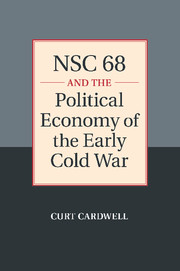Book contents
- Frontmatter
- Contents
- Acknowledgments
- Abbreviations
- Introduction
- 1 NSC 68 and the Problem of Origins
- 2 Multilateralism, the Soviet Threat, and the Origins of the Cold War
- 3 Multilateralism, the Dollar Gap, and the Origins of the Cold War
- 4 The Dollar Gap and Its Discontents
- 5 The British Sterling-Dollar Crisis of 1949–1950
- 6 The Origins and Development of NSC 68
- 7 The Political Economy of Rearmament
- Conclusion
- Select Bibliography
- Index
- References
4 - The Dollar Gap and Its Discontents
Published online by Cambridge University Press: 05 July 2011
- Frontmatter
- Contents
- Acknowledgments
- Abbreviations
- Introduction
- 1 NSC 68 and the Problem of Origins
- 2 Multilateralism, the Soviet Threat, and the Origins of the Cold War
- 3 Multilateralism, the Dollar Gap, and the Origins of the Cold War
- 4 The Dollar Gap and Its Discontents
- 5 The British Sterling-Dollar Crisis of 1949–1950
- 6 The Origins and Development of NSC 68
- 7 The Political Economy of Rearmament
- Conclusion
- Select Bibliography
- Index
- References
Summary
It is all too easy to see what would happen if aid were cut off in the middle of the [Marshall Plan] program. The European countries would simply have to slash drastically their imports from us.
Averell Harriman testimony before the House Committee on Foreign Affairs, February 22, 1950MR. MANSFIELD: Is it the contention of the State Department that by 1952 western Europe … would be in a position to stand on its own feet and carry on economic relations with the rest of the world?
SECRETARY ACHESON: No; I do not think I would say that it is the contention that that would be so. As I said, it all depends upon the success which we will have in dealing with the dollar-gap problem.
Dean Acheson testimony before the House Committee on Foreign Affairs, February 21, 1950As we saw in Chapter 3, in the immediate postwar years Truman administration foreign policy officials' efforts to cope with the dollar gap focused on providing loans and grants to cover the gap on the premise that such aid would buy time for western Europe to recover to the point that it could earn dollars at a high level of trade through the normal processes of trade. The European Recovery Program (ERP), or the Marshall Plan, was the principal program set up to accomplish this goal.
- Type
- Chapter
- Information
- NSC 68 and the Political Economy of the Early Cold War , pp. 92 - 127Publisher: Cambridge University PressPrint publication year: 2011



